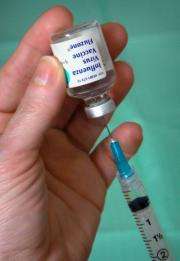College students who feel 'invincible' unlikely to accept vaccines

Vaccines to protect against sexually transmitted diseases, including HIV and herpes, are being developed and may soon be available to college students. However, limited research has been conducted to determine if students will accept the vaccines once they are available. In a new study, a University of Missouri researcher has found that students who feel invulnerable, or invincible, to physical harm are unlikely to get an HIV vaccine. Alternately, students who feel invulnerable to psychological harm are more likely to get the vaccine.
"Previous researchers have used invulnerability measures to predict health-endangering behaviors in students, but this study is unique in that it considers the role of invulnerability in students' health-protective or preventative behaviors," said Russell Ravert, assistant professor in the MU College of Human Environmental Sciences.
In the study, Ravert measured two invulnerability factors: danger and psychological. Students with increased danger invulnerability, those who viewed themselves as physically invincible, were more likely to decline the vaccine. One explanation is that strong feelings of danger invulnerability may be associated with decreased threat, which can diminish protective behaviors, Ravert said.
Students who felt psychological invulnerability, those who didn't care what others thought, were more likely to accept a vaccine. Students' psychological invulnerability may protect against the possible stigma associated with getting vaccinated for HIV, or other sexually transmitted diseases, Ravert said.
"It is important to determine what factors are associated with vaccine acceptance because not all students will be willing to take vaccines," Ravert said. "Efforts to promote vaccines should consider that students who aren't worried about being harmed are less likely to get the vaccine, even when it's warranted by their sexual behavior."
In the study, the strongest predictor of vaccine acceptance was students' perceived susceptibility to contracting HIV, followed by their number of sexual partners. Students' decisions also were influenced by the cost of the vaccine.
In future studies, Ravert will examine college students' invulnerability beliefs as they relate to risk-taking behaviors and other preventative health behaviors, as well as how invulnerability beliefs vary across age groups. The study, "College Student Invulnerability Beliefs and HIV Vaccine Acceptability," was based on Ravert's dissertation data from Indiana University. It was published in the July/August issue of the American Journal of Health Behavior.
Source: University of Missouri-Columbia (news : web)















